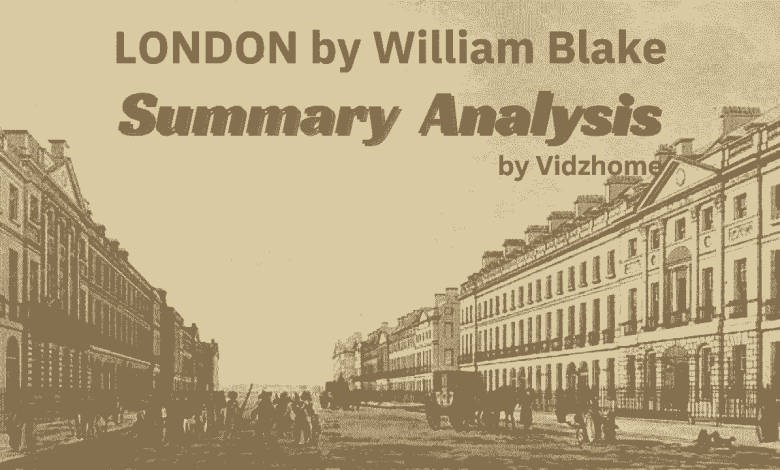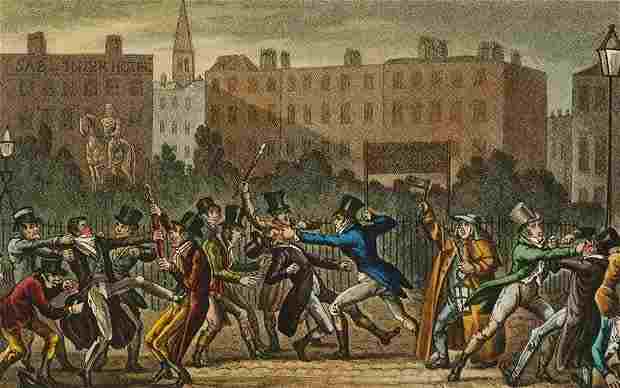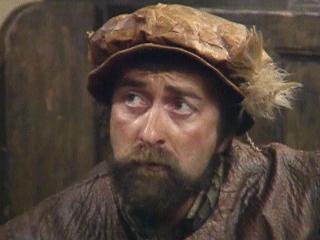
London by William Blake was written as a response to the social and political climate of his time.
During the late 18th century, London was experiencing rapid urbanization and industrialization, leading to widespread poverty, inequality, and social unrest. Click Here to Read the Original Text of the Poem.
Blake, who was deeply concerned about the plight of the common people and the moral decay of society, sought to expose the injustices and hardships faced by Londoners through his poetry.
Here is a brief London by William Blake Analysis for easy understanding of the students studying Romantic and Victorian Poetry:
Learn How to Write a Critical Analysis in Literature
London by William Blake Analysis

London by William Blake is a poignant exploration of the social and moral decay prevalent in urban life during the late 18th century. Through vivid imagery and evocative language, Blake paints a grim portrait of London society, where poverty, exploitation, and despair are ubiquitous.
The poem opens with the speaker wandering through the city streets, observing the marks of suffering etched on the faces of its inhabitants. The repeated use of the word “charter’d” emphasizes the oppressive nature of the city, where every aspect of life is tightly controlled and regulated.
Blake critiques the institutions of church and state for their complicity in perpetuating the suffering of the common people. The imagery of the “black’ning Church” and “blood down Palace walls” symbolizes the moral corruption and hypocrisy of those in power.
The phrase “mind-forg’d manacles” encapsulates the psychological chains that bind individuals in a society marked by oppression and exploitation.
The poem also explores the cyclical nature of despair and degradation, where the curse of the harlot leads to the tears of the newborn infant and the eventual decay of marriage and family life. This cyclical pattern reinforces the pervasive sense of hopelessness and futility that pervades the poem.
Overall, “London” serves as a powerful indictment of the social injustices and moral decay of Blake’s contemporary society, while also offering insights into the human condition and the enduring struggle for liberation and justice. Through his evocative imagery and poignant language, Blake invites readers to confront the harsh realities of urban life and to envision a more compassionate and equitable world.
Oedipus Rex Themes and Critical Summary (Sophocles)
London by William Blake Themes Analysis
Here is a complete London by William Blake Analysis including all the major themes:
Social Injustice:
In “London,” Blake vividly depicts the suffering and oppression experienced by the common people of London during his time.
Through imagery and language, he highlights the harsh realities of poverty, exploitation, and moral decay.
For example, the lines from London by William Blake “And mark in every face I meet / Marks of weakness, marks of woe” (lines 2-3) emphasize the visible signs of suffering etched on the faces of Londoners.
Blake’s own experiences growing up in London, witnessing the inequalities and injustices of urban life, likely influenced his portrayal of the city in the poem.
His upbringing in a working-class family exposed him to the hardships faced by ordinary people, which he later reflected in his poetry.
Marlowe’s The Tragic History of Dr Faustus Summary + Themes
Symbolism and Imagery:
Blake employs powerful symbolism and imagery to evoke the constrained and controlled nature of the city.
The repetition of the word “charter’d” in the opening lines of poem suggests the regulated and restricted environment of London, where every aspect of life is tightly controlled by authority.
Additionally, the imagery of “black’ning Church” and “blood down Palace walls” (lines 11-12) symbolizes the moral corruption and hypocrisy of the institutions of church and state, which Blake viewed as complicit in perpetuating the suffering of the common people in his poem London.
Aeschylus Prometheus Bound Summary, Themes(Critical Aspect)
The Mind-Forged Manacles:
The phrase “The mind-forg’d manacles” (line 8) encapsulates the psychological chains that bind individuals in a society marked by oppression and exploitation.
Here, William Blake suggests a major theme of London that the mental shackles of conformity, fear, and despair are as constraining as physical bondage.
This concept reflects Blake’s belief in the importance of mental liberation and the rejection of societal norms that suppress individuality and creativity.
It also aligns with his broader critique of the oppressive forces of authority and conformity in society.
Act wise Macbeth Summary By William Shakespeare
Critique of Institutions:
Blake’s critique of the institutions of church and state is evident throughout the poem. The image of the “black’ning Church” and the “blood” running down “Palace walls” (lines 11-12) serves as a condemnation of the moral corruption and hypocrisy of those in power in London by William Blake.
Blake’s own disillusionment with organized religion and political authority likely informed his critique of these institutions in his poetry.
As a visionary artist and poet, Blake sought to challenge conventional beliefs and advocate for a more just and equitable society.
Circe Goddess in Homer’s Odyssey (The Legendary Witch)
Cycle of Despair:
The poem ends with a grim depiction of the cycle of despair and degradation that plagues London society.
The curse of the youthful harlot leads to the tears of the newborn infant and the eventual decay of marriage and family life.
This cyclical pattern reinforces the pervasive sense of hopelessness and futility that pervades the poem.
Blake’s portrayal of this cycle reflects his belief in the interconnectedness of human experience and the pervasive influence of societal forces on individual lives.
It also underscores his critique of the dehumanizing effects of urbanization and industrialization on human relationships and values.
Ode: Intimations of Immortality Summary (Line by Line) +PPT

Conclusion
Blake’s own experiences growing up in London, witnessing the inequalities and injustices of urban life, likely influenced his decision to write London by William Blake.
As a visionary artist and poet, Blake was deeply attuned to the struggles of the working class and the disenfranchised, and he used his poetry as a tool for social critique and commentary.
Overall, “London” stands as a powerful critique of the social injustices and moral decay of Blake’s contemporary society, while also offering insights into the human condition and the enduring struggle for liberation and justice.
Through his evocative imagery and poignant language, Blake invites readers to confront the harsh realities of urban life and to envision a more compassionate and equitable world.



